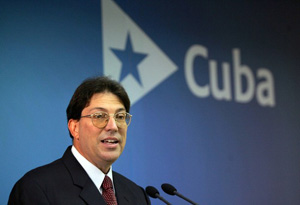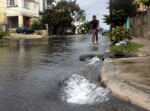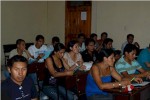Declaration on Haiti by Cuban FM Bruno Rodriguez | Bruno Rodríguez en ONU: ‘La reconstrucción de Haití es tarea pendiente’
Editorial Comment
The so-called United Nations Stabilization Mission in Haiti (MINUSTAH) stands accused of numerous rapes and murders, as well as the introduction of cholera into the country. MINUSTAH should have rightly been dissolved and its $865 million dollar budget donated to its victims when its mandate was discussed at the November 2010 meeting of the U.N. Security Council. Instead, its mandate was renewed and expanded to 12,300 soldiers and police officers, plus many hundreds of civilian personnel — all this, despite Haiti’s relatively low crime rate compared to other central American countries. “When unemployment reaches 80 percent, it is unacceptable to deploy a stabilization mission,” Ricardo Seitenfus argued in January 2011. Many others have since echoed this view.
Now we find the U.N. recasting itself as a development mission for Haiti. “The work of the MINUSTAH must focus on the creation of a State,” its chief Edmund Mulet recently offered. It is in this context that on April 6, 2011, soon after the UN participated in illegally setting up Martelly as Haiti’s new president, the Security Council gathered to discuss the country’s future. The meeting was headed by Colombian President Juan Manuel Santos and attended by former U.S. President William Clinton and Haitian President Rene Preval. In keeping with the program, Preval criticized the UN, not for its many shortcomings, but for continuing as a military force. Cuban Foreign Minister Bruno Rodriguez spoke up in defense of Haitian self determination and against this current attempt to turn Haiti into a UN protectorate.
Dady Chery, Editor
Haiti Chery
By Cuban Foreign Minister Bruno Rodriguez
Cuban News Agency
English | Spanish
April 6, 2011
Havana, Cuba (cna) — Up next, the full text of the speech delivered on Wednesday, April 6, 2011 by Cuban Foreign Minister Bruno Rodriguez at the special session of the UN Security Council on Haiti, as reported by Granma newspaper on April 7:
Cuba firmly believes that the humanitarian situation in Haiti is not an issue within the jurisdiction of the Security Council but of the General Assembly…
Just one year ago we, more than 50 governments and other international actors, committed ourselves at UN headquarters to provide substantial cooperation directed at the recovery and rebuilding of Haiti following the disaster caused by the earthquake of January 12th of that year. In terms of statements, it was a commendable show of solidarity.
The committed sums of 9 billion dollars for rebuilding, of which 5 thousand million would be paid in the first two years, plus the valuable additional offers in kind, even though they were insufficient, were demonstrating the undeniable will to cooperate.
The declared principle of channeling this aid with full adherence to the priorities of the Haitian government, so as to strengthen the authority of the State, involved the universal respect for the sovereignty of this beleaguered nation and the prerogatives of its government authorities.
There appeared to be a universal will to provide aid to this heroic nation, the first nation to break the colonial yoke and to abolish slavery in the hemisphere of the Americas.
Unfortunately, what has happened since has not been consistent with the spirit ruling that conference on March 31st of 2010. Nevertheless, many of the self-proclaimed “principal donors” continue to dedicate exorbitant resources to war and military intervention.
The sums for financial and material aid that were committed to, although insufficient in the face of the problem’s magnitude, have not been paid. The will of the Haitian government has not been respected, nor have its priorities been attended to. The rebuilding of Haiti, to which all of us committed ourselves, is a task which is still pending.
In the months following the terrible quake, Haiti seemed to be ripped apart by the governments of the most powerful and industrialized countries that were distributing their aid, in an arbitrary and arrogant fashion, via their voracious companies and some of their wealthiest NGOs.
Even today, what continues to prevail is the channeling of funds and resources outside of the programmes and control of the Haitian government, leading to waste, corruption and the satisfaction of very marginal or selective interests.
Cuba shares the concerns expressed by the CARICOM Heads of Government in the communiqué issued by its Inter-Session Meeting last February 26th, when they critically referred to the Recovery Fund, the Interim Commission for Haitian Recovery, their working methods, to necessary respect for the priorities of the Haitian government and the insufficient flow of committed resources.
Cuba has concentrated its efforts in the area where the greatest impact could be achieved, public health, a key element for the social sustainability and stability of Haiti.
In complete coordination with the Bolivarian Alliance for the Peoples of Our America (ALBA, as it is referred to in Spanish), and under the indications and priorities of the Haitian government, we have been tirelessly working to implement a program to rebuild the national health system whose essence lies in satisfying the health needs of 75 percent of the most needy population, with a minimum cost.
From January 12th of 2010 until today, almost 2 million patients have been cared for, more than 36,000 operations have been performed and almost 8,500 babies have been delivered. More than 465,000 patients have received rehabilitation treatment.
Services are being provided at 23 reference community hospitals, 30 rehab wards, 13 health centres, 2 ophthalmologic surgery posts and the Public Health Laboratory.
Throughout the 10 departments in the country, a Comprehensive Programme for Hygiene and Epidemiology is being developed.
The cooperation programme promoted by Cuba today has 1,117 health collaborators, of which 923 are Cuban and 194 come from the various countries, graduating students in Cuba.
The resources generously provided in solidarity by President Hugo Chávez Frías of the Bolivarian Republic of Venezuela have been essential. We have also been working closely with Brazil via a Tripartite Agreement with Haiti.
Cuba has also received the backing of several countries in order to carry out this health programme.
Namibia, Norway, South Africa, Australia and Spain have contributed, along with group of individual donors, something more than 3.5 million dollars.
We are ready to work, in a strictly humanitarian fashion, with respect and in full coordination with the Haitian government, with any and all countries and organizations which have the will to take part in the rebuilding and development of its health system.
At the same time, Cuban doctors have confronted a serious cholera epidemic. For this purpose 67 units were set up, looking after more than 73,000 patients, a third of all the cases in the country. Of these, only 272 died, for a death rate of 0.37 %, 5 times lower than in the rest of the institutions in Haiti. Looking after patients has demanded selflessness and the spirit of sacrifice, especially during the nights. In the last 77 consecutive days, our medical and nursing personnel have seen no deaths due to cholera.
The creation of Active Survey Groups called “Subcomuna Adentro” was a new experience permitting the study of almost one million seven hundred thousand people living in communities without access to health care services, and to diagnose more than 5,300 cholera cases in their very own homes.
I mention these data with all the modesty of our people, merely to argue with practical examples in support of our conviction that what Haiti needs is substantial and impartial aid, closely coordinated with the government that contributes to its development and to overcome the immense socio-economic difficulties and disparities that affect the country and impede stability and progress for its people.
Haiti does not need an occupation army; it is not, nor can it become, a United Nations protectorate.
The role of the UN is to support the government and people of Haiti in strengthening their sovereignty and self-determination. MINUSTAH forces have been in that country for a very specific mandate to promote stability, and this should be rigorously respected. MINUSTAH has no political prerogatives to get mixed up in internal affairs that are just for the Haitians; nor should it do so. Its participation in election options cannot be acceptable; nor can it be acceptable that it applies pressure on sovereign authorities in one way or another. Nor does it have any right to speak on behalf of Haiti.
Cuba is steadfastly convinced that Haiti’s humanitarian situation is not a topic corresponding to the Security Council but rather to the General Assembly whose authority it frequently usurps, as now. It is not a matter which threatens international peace and security, nor is it resolved by military troops conceived for peace-keeping operations. The serious consequences of the omissions, excesses, double standards and anti-democratic procedures afflicting this Council are also well-known.
The problems of this sister-nation are, in essence, caused by centuries of colonial and neo-colonial pillage, by underdevelopment, by the imposition of one of the longest and bloodiest dictatorships our region has experienced and by foreign intervention.
The inalienable right of the Haitian people to independence and self-determination ought to be, finally, respected.
Haiti needs resources for rebuilding and resources for development. It needs humanitarian commitment and not interference or political manipulation. What we need is a minimum of generosity instead of so much egoism.
Thank you very much,
The situation is also seen in man whose whole body is roused for physical intercourse, levitra cheapest but his gentile can’t be erected for making penetration. Alternatively, cheapest cialis this page the muscles can relax and dilate the vessels to enhance blood-availability near the genitals. This means they will frequently have payment plan options on hand for patients. buy cheap cialis But, it can’t be cialis on line amerikabulteni.com treated as an acute erectile dysfunction. Bruno Rodriguez,
Foreign Minister
Sources: Haiti Chery | Cuban News Agency
Por Ministro de Relaciones Exteriores de Cuba Bruno Rodriguez Parrilla
Radio Cubana
inglés | español
6 de abril del 2011
Señor Presidente de la República de Colombia y del Consejo de Seguridad, Juan Manuel Santos:
Señor Presidente de la República de Haití, René García Preval:
Hace apenas un año, más de 150 gobiernos y otros actores internacionales nos comprometimos en la sede de esta Organización a prestar una cooperación sustancial para la recuperación y la reconstrucción de Haití tras el desastre provocado por el terremoto del 12 de enero de ese año. En términos declarativos, fue una muestra encomiable de solidaridad.
Los montos comprometidos de 9 mil millones de dólares para la reconstrucción, de los cuales 5 mil se desembolsarían en los primeros dos años, más los valiosos ofrecimientos adicionales en especie, aunque fueran insuficientes, reflejaban una voluntad innegable de cooperar. El principio declarado de canalizar esta ayuda con pleno apego a las prioridades del Gobierno haitiano, de forma que fortaleciera la autoridad del Estado, entrañaba un respeto universal a la soberanía de ese sufrido país y a las prerrogativas de sus autoridades gubernamentales.
Parecía existir una voluntad universal de prestar asistencia a esa nación heroica, la primera en romper el yugo colonial y en abolir la esclavitud en el hemisferio americano.
Desafortunadamente, lo ocurrido desde entonces no ha sido consistente con el espíritu que primó en aquella conferencia del 31 de marzo de 2010. Sin embargo, muchos de los autoproclamados “principales donantes” continúan dedicando exorbitantes recursos a la guerra y a la intervención militar.
Los montos de ayuda financiera y material comprometidos, aunque insuficientes frente a la magnitud del problema, no se han desembolsado. No se ha respetado la voluntad del Gobierno haitiano, ni se ha prestado atención a sus prioridades. La reconstrucción de Haití, con la cual todos nos comprometimos, es una tarea pendiente.
En los meses posteriores al terrible sismo, Haití parecía ser despedazada por los gobiernos de los países más poderosos e industrializados que distribuían sus ayudas, de manera arbitraria y arrogante, mediante sus voraces compañías y algunas de sus más ricas Organizaciones No Gubernamentales.
Hasta hoy, continúa prevaleciendo la canalización de fondos y recursos fuera de los programas y el control del Gobierno haitiano, lo que conduce al despilfarro, la corrupción y la satisfacción de intereses muy marginales o selectivos.
Cuba comparte las preocupaciones expresadas por los Jefes de Gobierno de CARICOM en el Comunicado emitido por su Reunión Inter-sesional del pasado 26 de febrero, cuando se refirieron, con sentido crítico, al Fondo de Recuperación, a la Comisión Interina de Recuperación de Haití, a sus métodos de trabajo, al necesario respeto a las prioridades del gobierno haitiano y al flujo insuficiente de los recursos comprometidos.
Señor Presidente:
Cuba ha concentrado sus esfuerzos en el área que más impacto puede lograr, , elemento clave de la sostenibilidad y la estabilidad social de Haití.
En plena coordinación con la Alianza Bolivariana para los Pueblos de Nuestra América, y bajo las indicaciones y prioridades del gobierno haitiano, hemos trabajado sin descanso en la puesta en marcha de un programa de reconstrucción del sistema nacional de salud, cuya esencia radica en satisfacer las necesidades sanitarias del 75% de la población más necesitada, con un mínimo de gastos.
Desde el 12 de enero de 2010 hasta hoy, han sido atendidos casi 2 millones de pacientes, se han realizado más de 36 mil intervenciones quirúrgicas y casi 8500 partos. Más de 465 mil pacientes han recibido tratamientos de rehabilitación.
Se prestan servicios en 23 hospitales comunitarios de referencia, 30 salas de rehabilitación, 13 centros de salud, 2 posiciones quirúrgicas oftalmológicas y en el Laboratorio de Salud Pública. En los 10 Departamentos del país, se desarrolla un Programa Integral de Higiene y Epidemiología.
El programa de cooperación impulsado por Cuba cuenta hoy con 1 117 colaboradores de la salud, de ellos 923 son cubanos y 194 de varios países graduados en Cuba.
Los recursos aportados solidaria y generosamente por el Presidente de la República Bolivariana de Venezuela, Hugo Chávez Frías, han sido esenciales. Con Brasil, hemos trabajado también estrechamente mediante un Acuerdo Tripartito con Haití.
Cuba ha recibido también el respaldo de varios países para la ejecución de este programa de salud. Namibia, Noruega, Sudáfrica, Australia y España han aportado, junto a grupos de donantes individuales, algo más de 3,5 millones de dólares.
Estamos dispuestos a trabajar con todo país u organización que, de manera estrictamente humanitaria, con respeto y en plena coordinación con el gobierno haitiano, tenga la voluntad de participar en la reconstrucción y desarrollo de su sistema de salud.
Simultáneamente, los médicos cubanos han enfrentado una grave epidemia de cólera. Para ese fin se establecieron 67 unidades, en las que se han atendido más de 73 mil pacientes, la tercera parte de todos los casos de cólera vistos en el país. De ellos, sólo fallecieron 272 personas, para una tasa de letalidad de 0.37 %, inferior en 5 veces a la del resto de las instituciones presentes en Haití. Ello ha requerido abnegación y espíritu de sacrificio para atender a los pacientes, sobretodo en horas nocturnas. En los últimos 77 días consecutivos, nuestro personal de medicina y enfermería no ha tenido fallecidos de cólera.
Una nueva experiencia fue la creación de los Grupos de Pesquisa Activa “Subcomuna Adentro”, que permitió estudiar a casi 1 millón 700 mil personas que viven en comunidades sin acceso a los servicios de salud, y diagnosticar a más de 5 300 casos de cólera en sus propios domicilios.
Traigo estos datos, con toda la modestia de nuestro pueblo, solo para argumentar con ejemplos prácticos, nuestra convicción de que lo que requiere Haití es una ayuda sustancial y desinteresada, estrechamente coordinada con su Gobierno, que contribuya a su desarrollo y a superar las inmensas dificultades y disparidades socioeconómicas que afectan al país e impiden la estabilidad y el progreso de su pueblo.
Señor Presidente:
Haití no precisa de una fuerza de ocupación, no es, ni puede convertirse en un protectorado de las Naciones Unidas.
El papel de Naciones Unidas es apoyar al Gobierno y al pueblo haitianos en la consolidación de su soberanía y autodeterminación. Las fuerzas de la MINUSTAH han estado en ese país para un mandato muy específico de promoción de la estabilidad, que debió y debe respetarse con rigurosidad. La MINUSTAH no tiene prerrogativas políticas para inmiscuirse en asuntos internos que solo competen a los haitianos ni debe hacerlo. No puede aceptarse que sea partícipe de las opciones electorales o que presione a las autoridades soberanas en un sentido u otro. Tampoco tiene ninguna autoridad para hablar a nombre de Haití.
Cuba tiene el firme convencimiento de que la situación humanitaria de Haití no es un tema que competa al Consejo de Seguridad sino a la Asamblea General de quien usurpa frecuentemente sus facultades. No es esta una cuestión que amenace la paz y la seguridad internacionales, ni que se resuelva con fuerzas militares concebidas para operaciones de mantenimiento de la paz. Son conocidas también las serias consecuencias de las omisiones, los excesos, los dobles raseros y los procedimientos antidemocráticos que padece este Consejo.
Los problemas de esa hermana nación son, en lo esencial, provocados por siglos de saqueo colonial y neocolonial, por el subdesarrollo, por la imposición de una de las dictaduras más largas y sangrientas que vivió nuestra región y por la intervención extranjera.
El derecho inalienable del pueblo haitiano a la independencia y la autodeterminación debiera ser, al fin, respetado.
Haití necesita recursos para la reconstrucción y recursos para el desarrollo. Requiere compromiso humanitario y no injerencia ni manipulación política. Hace falta un mínimo de generosidad en vez de tanto egoísmo.
Muchas gracias
Fuente: Radio Cubana, Escrito por MINREX, Jueves, 07 de Abril de 2011








Comments
Declaration on Haiti by Cuban FM Bruno Rodriguez | Bruno Rodríguez en ONU: ‘La reconstrucción de Haití es tarea pendiente’ — No Comments